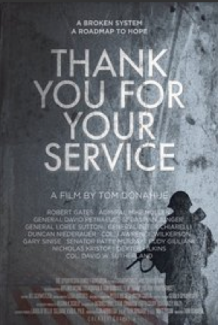Thank You For Your Service (Tom Donahue, 2015): USA
Reviewed by Wayne Derossett. Viewed at the Santa Barbara Film Festival 2016, Monday, February 8, 5:00 PM at the Metro 1 theater.
This film is not to be confused with Thank You For Your Service (Jason Hall, 2016): USA, starring Amy Schumer, or the rumored production of Thank You For Your Service (Steven Spielberg, 2017): USA, or David Finkel’s 2013 book by the same name.
This is one of the best constructed documentary films I have seen. Excellent in terms of content, structure, visuals and pacing. It is a powerful and moving film with a strong and compelling message.
There is no doubt the recent wars in Iraq and Afghanistan have left a tragic legacy of American soldiers who return home with broken bodies. Equally disturbing are the effects of Post Traumatic Stress Disorder (PTSD), Traumatic Brain Injury (TBI), and the shocking numbers of veteran suicides. This is a documentary about the relationship between veterans as they return to civilian life and the mental health issues they encounter, and how the current Veterans Administration medical system is neglecting these needs.
Included in the film are several retired top brass who would speak on camera, including Secretary of Defense Robert Gates (ret.), Admiral Mike G. Mullen (ret.), and retired United States Army Colonel and former chief of staff to United States Secretary of State, Lawrence B. Wilkerson. Also in the film is PTSD expert Colonel (ret.), Charles Hoge, M.D., and New York Times journalists Dexter Filkins and Nicholas Kristof, as well as journalist and Perfect Storm author Sebastian Junger. Veteran advocate and actor, Gary Sinise also talks about his veteran support programs.
Along with the effects of combat, this film talks about another significant stressor; the effects of military programs for “loss control” through extended unscheduled redeployment, and how these impact family relationships and tear away at a soldier’s psyche.
The film also describes the concept of “moral injury,” a psychological phenomenon where a person’s moral structure is damaged by the barbaric acts forced upon an individual in times of war. This is one of the more subtle and disturbing forms of injury, eating away at the inner soul of a person. Unlike in WWII where there was a clear imperative to vanquish an enemy and a system to reenter society through civilian reintegration camps, the recent wars abruptly discharge a soldier and leave them without an affirming victory parade.
They are left alone and with serious voids to reconcile their inner conflicts. This often leads to isolation and depression. This film makes a strong case for a separate Behavioral Health Corps in the U.S. military to address mental health issues, since they are not being adequately addressed in the existing Medical Corps.
Private transition programs, such as the Save The Warrior bootcamp, and the Gary Sinise Foundation shown in this film help soldiers transition back to normal life, and deal with the “void of no comradery.”
See this film. The next veteran you encounter needs your support.
#BHCNOW
About this entry
You’re currently reading “Thank You For Your Service (Tom Donahue, 2015): USA,” an entry on Student Film Reviews
- Published:
- 02.20.16 / 8pm
- Category:
- Documentary, Films, Santa Barbara Film Festival 2016

3 Comments
Jump to comment form | comments rss [?]